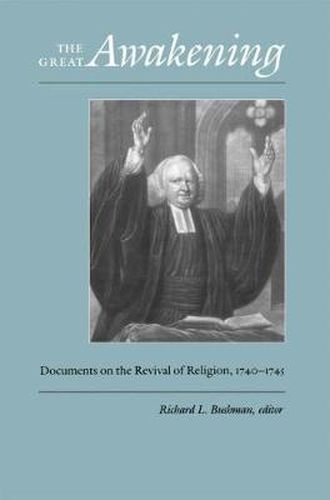Readings Newsletter
Become a Readings Member to make your shopping experience even easier.
Sign in or sign up for free!
You’re not far away from qualifying for FREE standard shipping within Australia
You’ve qualified for FREE standard shipping within Australia
The cart is loading…






Most twentieth-century Americans fail to appreciate the power of Christian conversion that characterized the eighteenth-century revivals, especially the Great Awakening of the 1740s. The common disdain in this secular age for impassioned religious emotion and language is merely symptomatic of the shift in values that has shunted revivals to the sidelines. The very magnitude of the previous revivals is one indication of their importance. Between 1740 and 1745 literally thousands were converted. From New England to the southern colonies, people of all ages and all ranks of society underwent the New Birth. Virtually every New England congregation was touched. It is safe to say that most of the colonists in the 1740s, if not converted themselves, knew someone who was, or at least heard revival preaching. The Awakening was a critical event in the intellectual and ecclesiastical life of the colonies. The colonists’ view of the world placed much importance on conversion. Particularly, Calvinist theology viewed the bestowal of divine grace as the most crucial occurrence in human life. Besides assuring admission to God’s presence in the hereafter, divine grace prepared a person for a fullness of life on earth. In the 1740s the colonists, in overwhelming numbers, laid claim to the divine power which their theology offered them. Many experienced the moral transformatoin as promised. In the Awakening the clergy’s pleas of half a century came to dramatic fulfillment. Not everyone agreed that God was working in the Awakening. Many believed preachers to be demagogues, stirring up animal spirits. The revival was looked on as an emotional orgy that needlessly disturbed the churches and frustrated the true work of God. But from 1740 to 1745 no other subject received more attention in books and pamphlets. Through the stirring rhetoric of the sermons, theological treatises, and correspondence presented in this collection, readers can vicariously participate in the ecstasy as well as in the rage generated by America’s first national revival.
$9.00 standard shipping within Australia
FREE standard shipping within Australia for orders over $100.00
Express & International shipping calculated at checkout
Most twentieth-century Americans fail to appreciate the power of Christian conversion that characterized the eighteenth-century revivals, especially the Great Awakening of the 1740s. The common disdain in this secular age for impassioned religious emotion and language is merely symptomatic of the shift in values that has shunted revivals to the sidelines. The very magnitude of the previous revivals is one indication of their importance. Between 1740 and 1745 literally thousands were converted. From New England to the southern colonies, people of all ages and all ranks of society underwent the New Birth. Virtually every New England congregation was touched. It is safe to say that most of the colonists in the 1740s, if not converted themselves, knew someone who was, or at least heard revival preaching. The Awakening was a critical event in the intellectual and ecclesiastical life of the colonies. The colonists’ view of the world placed much importance on conversion. Particularly, Calvinist theology viewed the bestowal of divine grace as the most crucial occurrence in human life. Besides assuring admission to God’s presence in the hereafter, divine grace prepared a person for a fullness of life on earth. In the 1740s the colonists, in overwhelming numbers, laid claim to the divine power which their theology offered them. Many experienced the moral transformatoin as promised. In the Awakening the clergy’s pleas of half a century came to dramatic fulfillment. Not everyone agreed that God was working in the Awakening. Many believed preachers to be demagogues, stirring up animal spirits. The revival was looked on as an emotional orgy that needlessly disturbed the churches and frustrated the true work of God. But from 1740 to 1745 no other subject received more attention in books and pamphlets. Through the stirring rhetoric of the sermons, theological treatises, and correspondence presented in this collection, readers can vicariously participate in the ecstasy as well as in the rage generated by America’s first national revival.